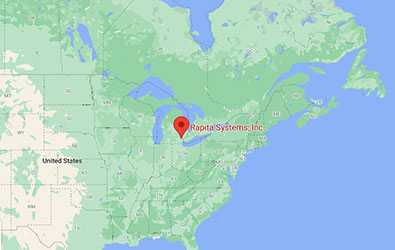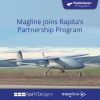York, UK, 24th September 2010 Rapita Systems have released the latest version of the RapiTime measurement and analysis tool. Quickly dubbed a “must-have” by the on-target timing verification specialists, RapiTime 2.4 is for engineers and managers responsible for timing analysis of critical real-time C++ embedded systems. The new product launch comes against a background of growing C++ use, a trend illustrated by the choice of C++ as the preferred programming language for the new Joint Strike Fighter (JSF) or F-35. Due to go into service by 2014, the JSF will replace the F-16 Fighting Falcon and the A-10 Thunderbolt II. The new fighter airplane is expected to represent a gigantic leap forward in the development of advanced avionics communications and flight systems. One of the biggest challenges of using C++ in complex safety-critical real-time embedded systems such as fighter airplanes is that it may not relate to the target code as closely as C. Manually measuring the timing performance of individual parts of the code may therefore become much harder than before unless you take the automated RapiTime approach. The capacity to quickly identify the source of timing problems and carry out targeted optimization work means RapiTime 2.4 with C++ support helps engineers and managers overcome this challenge. Speaking on the eve of the launch, Product Development Director Dr Antoine Colin says RapiTime 2.4 “gives developers using C++ a previously unavailable ability to pinpoint performance problems, and to identify exactly where optimization efforts should be focused”. “This new functionality promises to make RapiTime v2.4 a must-have product for engineers and managers”, added Colin. Features which support execution time measurement, worst-case execution time analysis, debugging support and performance optimization are still included in the new version. RapiTime support is also still available for C and Ada users. “That won’t change for the foreseeable future”, added Colin, “we just wanted to acknowledge that as the world gradually moves on, as shown by the choice of C++ for the JSF and other large critical real-time embedded systems, so must timing analysis.”

Industry leading verification tools & services
Rapita Verification Suite (RVS)
RapiTest - Unit/system testing RapiCover - Structural coverage analysis RapiTime - Timing analysis (inc. WCET) RapiTask - Scheduling visualization RapiCoverZero - Zero footprint coverage analysis RapiTimeZero - Zero footprint timing analysis RapiTaskZero - Zero footprint scheduling analysis RapiCouplingPreview - DCCC analysis
Latest from Rapita HQ
Technical resources for industry professionals
Discover Rapita
Who we are
US office
+1 248-957-9801info@rapitasystems.com
Rapita Systems, Inc.
41131 Vincenti Ct.
Novi
MI 48375
USA

UK office
+44 (0)1904 413945info@rapitasystems.com
Rapita Systems Ltd.
Atlas House
Osbaldwick Link Road
York, YO10 3JB
UK

Spain office
+34 93 351 02 05info@rapitasystems.com
Rapita Systems S.L.
Parc UPC, Edificio K2M
c/ Jordi Girona, 1-3
Barcelona 08034
Spain

Working at Rapita
Careers
- Solutions
- Latest
- Company
- Discover
- Multicore Timing Analysis
- Embedded Software Testing Tools
- Worst Case Execution Time
- WCET Tools
- Code coverage for Ada, C & C++
- MC/DC Coverage
- Verifying additional code for DO-178C
- Timing analysis (WCET) & Code coverage for MATLAB® Simulink®
- Data Coupling & Control Coupling
- Aerospace Software Testing
- Automotive Software Testing
- Certifying eVTOL
- DO-178C
- AC 20-193 and AMC 20-193
- ISO 26262
- What is CAST-32A?
All materials © Rapita Systems Ltd. 2025 - All rights reserved | Privacy information | Trademark notice Subscribe to our newsletter

 Hybrid electric pioneers, Ascendance, join Rapita Systems Trailblazer Partnership Program
Hybrid electric pioneers, Ascendance, join Rapita Systems Trailblazer Partnership Program
 Magline joins Rapita Trailblazer Partnership Program to support DO-178 Certification
Magline joins Rapita Trailblazer Partnership Program to support DO-178 Certification
 Eve Air Mobility joins Rapita Systems Trailblazer Partnership Program for eVTOL projects
Eve Air Mobility joins Rapita Systems Trailblazer Partnership Program for eVTOL projects
 How to certify multicore processors - what is everyone asking?
How to certify multicore processors - what is everyone asking?
 Data Coupling Basics in DO-178C
Data Coupling Basics in DO-178C
 Control Coupling Basics in DO-178C
Control Coupling Basics in DO-178C
 Components in Data Coupling and Control Coupling
Components in Data Coupling and Control Coupling
 DO-278A Guidance: Introduction to RTCA DO-278 approval
DO-278A Guidance: Introduction to RTCA DO-278 approval
 ISO 26262
ISO 26262
 Data Coupling & Control Coupling
Data Coupling & Control Coupling
 Verifying additional code for DO-178C
Verifying additional code for DO-178C
 DO-178C Multicore In-person Training (Bristol)
DO-178C Multicore In-person Training (Bristol)
 DO-178C Multicore In-person Training (Fort Worth, TX)
DO-178C Multicore In-person Training (Fort Worth, TX)
 DO-178C Multicore In-person Training (Toulouse)
DO-178C Multicore In-person Training (Toulouse)









